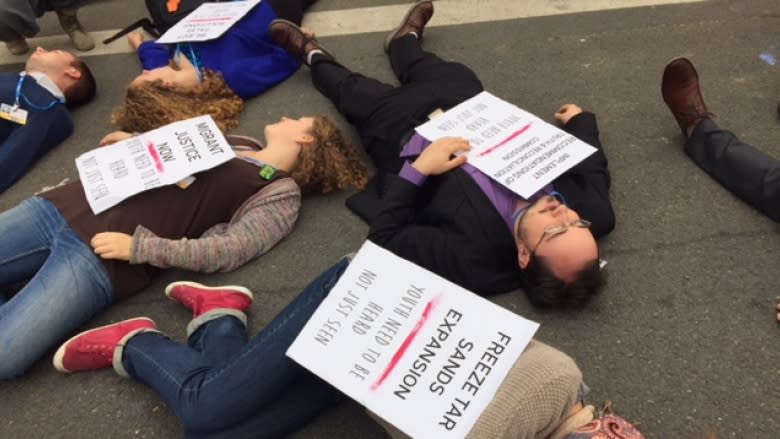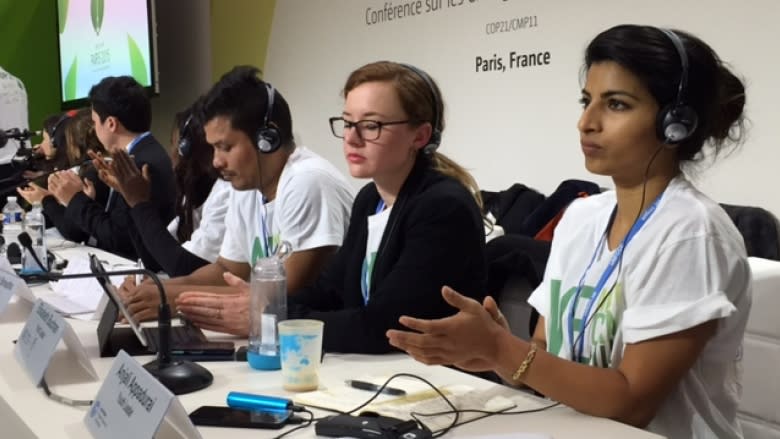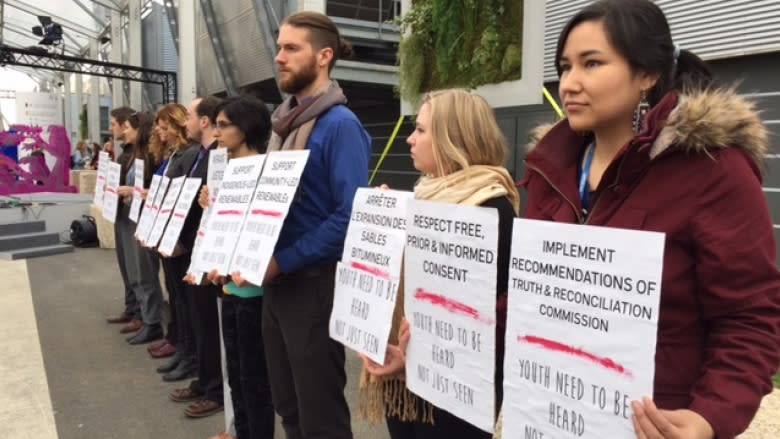Canada's youth call out Justin Trudeau before the world's cameras
On a day that was supposed to celebrate the contributions of youth at the Paris climate conference, a group of young Canadians stood before the world's cameras and publicly called out their new young prime minister.
"Youth want to be heard, not just seen," they chanted, each holding up at least one placard that both hid their face and showed one of their demands.
The public display of disappointment in Prime Minister Justin Trudeau put on by the Canadian Youth Delegation didn't quite square with the early impression the 43-year-old prime minister left during his brief appearance here at COP21.
Trudeau impressed many here for the same reasons he impressed many young Canadians: for, among other things, his words promising action, for his own youth, for not being Stephen Harper.
But then Trudeau did not make time while here to meet the youth delegation, despite repeated requests. The resulting complaint from the 20-somethings on Young and Future Generations Day mocked Trudeau's proclivity for selfies —hence the slogan.
It all sounded like it could be the beginnings of a chink in his appeal to some among Canada's youth for whom fighting climate change is a priority.
"It makes me feel really disheartened," 27-year old delegation member Aleah Loney said.
"This government was elected not even two months ago on the promise of real change, and that's what we were hoping to see here.
"It's been very confusing to be told one thing, and then seeing another."
Appreciation, but also wariness
Canada's reputation in these hallways is still very much in flux.
No question, Trudeau's promises of Canada being "back" and playing a constructive role in the talks here sounded comforting — to Canadians, and to other delegates — in the early days of the conference. His decision to bring so many stakeholders, and to unmuzzle scientists, have been noted here.
Green Party Leader Elizabeth May's emotional description of the reception she received here following Trudeau's speech reflects the largely positive reception to a Canada seemingly much more engaged on fighting climate change than Harper's government.
"Canada was just hated," she told CBC News.
"It's just night and day. People are happy to see Canadian delegates.… I'm going to get emotional about this, I'm sorry. It was just amazing. Negotiators from other countries were coming up and hugging me."
As the talks here enter a critical phase though, and as Canadian officials have been making their presence known, knowledge of Canada's new posture is becoming more nuanced.
There is appreciation for the funding it provided early to help developing countries reduce emissions, but also wariness of its decision to keep (for now) to relatively unambitious national targets set by the previous government.
Canada's apparently greener, shinier self is also still contending with the vestiges and the decisions of its predecessor.
Canada's main negotiators — the same under both governments — have been freed somewhat of what must have been restrictive instructions under Harper, but they are, in ways, still living in its shadow.
In the ongoing tension between developing and developed countries in the negotiations here, India apparently used Canada as the example of why it's hard for developing nations to have much trust, given that under Harper, Canada abandoned the Kyoto protocol after promising to live by it.
Attempt to regain trust
In a background briefing with journalists last week, a Canadian official suggested Canada is trying to regain that trust, to assure developing nations that "we will support them and help them and give them capacity building."
Environment and Climate Change Minister Catherine McKenna will also be back Sunday and will "play a very active role in negotiations next week," the official said.
Canadian and foreign observers say that next week's ministerial talks could be where the new Canada proves itself indispensable.
It has made some strides in the current negotiations, says Louise Comeau of Canada's Climate Action Network.
Canada could be doing more for example on the controversial subject of compensation for countries that contribute little to climate change, but suffer its worst consequences.
"We want to see them also help make sure there's a solid review mechanism," she said.
Still, "We think Canada is actually playing a pretty positive role."
But that role is still relatively muted. Canada's improving reputation here seems to benefit more from the successes independently won by provinces and cities.
Those advances are being recognized here. Former vice-president and environmentalist Al Gore praised both Quebec and Manitoba this week. Vancouver was given an award to recognize it as having the greenest city action plan.
Canada as a whole gets the accolades.
Canada must live up to the hype
Many organizations — and Canadian youth — would like to see Canada also take a harder edge on some of the harder issues as the final week of negotiations begins.
Why not commit to zero net emissions by 2050, as some cities have, they ask? Or, why not commit itself to a maximum global average temperature rise of 1.5 C, the lower of two competing options?
"I feel that the hope that was generated around our shift in government has propelled us forward," says 25-year old activist Anjali Appadurai, who is a former CYD member and is now with West Coast Environmental Law Association's climate program.
"Sometimes there's a little bit of… naiveté with that hope.
"I know that Trudeau hasn't been very specific with his comments and his commitments in the public eye. And hasn't really engaged deeply with young people who are asking very critical and tough questions.
"So I'd like to see more of a critical eye and more of a willingness from civil society to really hold the government accountable."
The youth here are passionately dedicated — some skipped school and work, and painstakingly fundraised money to be here. They grew up believing climate change is a reality. They came worried about their future, as many world leaders have admitted they should be.



